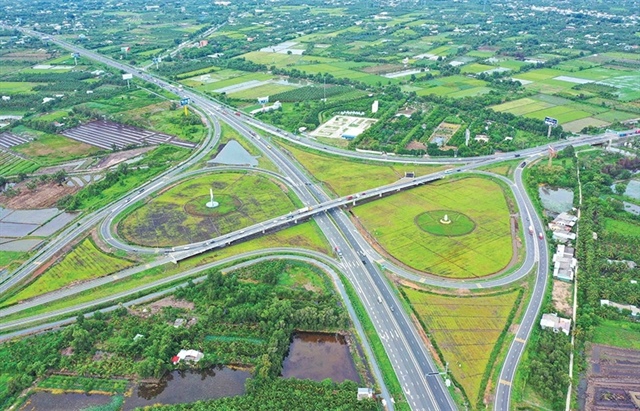Agriculture-exporting Vietnam still relies heavily on imports
Agriculture-exporting Vietnam still relies heavily on imports
Even though Vietnam is an agricultural country with 80 percent of its population living in rural areas, the Southeast Asian country spends several billion dollars every year importing agricultural products.

Statistics show that the Vietnamese have been importing peanuts for several years, primarily from India, Senegal, and China.
According to numbers from the General Department of Vietnam Customs, Vietnam has imported 12,000 metric tons of peanuts over the last six months.
In 2015, Vietnam imported 35,000 metric tons, a 146 percent increase compared to 23,000 metric tons in 2014.
Surprisingly, China has been Vietnam’s number-one source of peanut imports in the last three years, but peanuts are still being exported the other way round every harvest season.
The price of peanuts that Vietnam imports from China is unexpectedly cheap, only VND5,500 to VND6,000 a kg, relative to the rate of those shipped from other countries, which are around VND15,000 to VND22,000 (US$1) a kg.
The price of peanuts imported from China into Vietnam is also much lower than that of peanuts exported from Vietnam to China.
According to peanut traders in the north-central and Central Highlands regions, the price of peanuts exported to China has always stayed above VND30,000 ($1.36) a kg in the last three years.
“I cannot understand how [Chinese traders] bought peanuts at such a high price from Vietnam and shipped them back to the country at extremely cheap prices, even cheaper than unprocessed peanuts in Vietnam,” a Vietnamese trader said, expressing his surprise upon hearing of how cheap peanuts from China are sold to Vietnam.
According to the Ministry of Industry and Trade, peanuts are imported primarily for use in the snack food industry.
Due to the industry’s high speed of growth, the Ministry of Industry and Trade predicted that peanut imports will rise in the future.
The U.S. Department of Agriculture said in a report that the area of peanut-growing land in Vietnam is only around 220,000 ha, with an output of 550,000 metric tons a year, merely meeting 75 percent of demand.
The importation of peanuts will most likely be above 200,000 metric tons in the coming years.
Imports on the rise
Peanuts are not the only agricultural products imported into Vietnam.
According to the Ministry of Agriculture and Rural Development, Vietnam has imported more than 1.87 million metric tons of wheat at a cost of $398 million during the first seven months of 2016, a 37.4 percent year-on-year increase.
In the same period, Vietnamese businesses have also imported 582,000 metric tons of cashew nuts, mainly from Africa.
According to the Vietnam Cashew Association, Vietnamese factories can currently process 1.3 million tons of cashew nuts a year, while the number of domestically-produced raw cashews can only meet 30 percent to 40 percent of demand.
Therefore, Vietnamese businesses have to import cashew nuts in order to keep up with the capacity of their factories.
Similarly, businesses that process fishing products are importing raw materials from foreign countries.
In the first seven months of 2016, fishery businesses have imported almost $600 million worth of raw materials.
Vietnamese businesses also spend several billion dollars on materials and products for the livestock industry, importing $1.85 billion worth of animal feed and raw materials in the first seven months of 2016.
Compared to the value of rice exports in the same period, that of animal feed exported is $500 million higher.
In the first seven months of 2016, Vietnam has also bought over 800,000 metric tons of soybeans and 3.8 million metric tons of corn in order to produce animal feed.
Le Ba Lich, president of the Vietnam Animal Feed Association, said that Vietnamese dependence on foreign countries for animal feed has been flagged for a long time, but, up until now, there has not been an effective solution.
Better than self-production?
According to experts, the policy of prioritizing rice over other agricultural produce in the last few years has led to a situation in which Vietnam, having become one of the top global exporters of rice, is unable to meet domestic demand for other agro-produce, such as peanuts, soybeans, and corn, and forced to purchase these from other countries.
“Vietnamese soybean supply is not even enough to make tofu, so firms have had to import soybeans to produce cooking oil, soymilk, and animal feed. Corn and peanuts are in the same situation. Without careful investment, output is low and prices are high, so businesses are forced to import everything,” Lich lamented.
Pham Duc Binh, managing director of Thanh Binh JSC, said that domestic raw materials for animal feed are often low in supply and more expensive.
Meanwhile, raw materials imported from foreign countries can be sourced at a far cheaper price than that of domestic raw materials. Businesses have no other choice but to import.
For example, according to Binh, the price of domestic corn on July 26 was VND7,000 a kg, while that of imports was only VND5,800-6,000 a kg, with supply always ready.
A company specializing in importing animal feed in Ho Chi Minh City stated that prices of imported goods delivered in August and September are especially cheap.
More specifically, soybeans imported from the U.S. in August and September fetch only around $450 to $455 a metric ton, or VND10,000 a kg, only half the price of domestic soybeans.
Binh said that countries such as the United States, Brazil, or Argentina have extensive land, a highly-developed agricultural plant research sector, and highly-advanced farming methods, all of which has contributed to the low price of their agricultural products.
“There needs to be an effective policy in order to develop the domestic raw material sector so that it can compete with imports, but one should not be unreasonably averse to imported goods,” Binh advised.





















